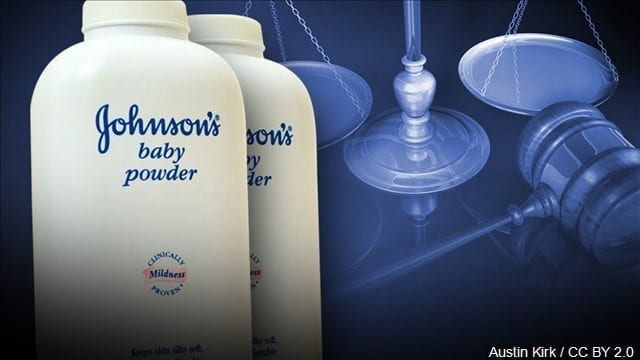On August 22nd, I reported on a huge verdict for the plaintiff in a case against Johnson & Johnson (J&J) over the company’s talc-based baby powder. The plaintiff, Mrs. Eva Echeverria, is currently undergoing aggressive treatment of ovarian cancer; a disease she (and the jury) believes is the result of years of using J&J’s baby powder for feminine hygiene. Mrs. Echeverria was awarded $417M ($70M in non-economic damages and $347M in punitive damages). The total in talc-related verdicts against J&J is now over $720M. All for want of a simple warning label.
On August 22nd, I reported on a huge verdict for the plaintiff in a case against Johnson & Johnson (J&J) over the company’s talc-based baby powder. The plaintiff, Mrs. Eva Echeverria, is currently undergoing aggressive treatment of ovarian cancer; a disease she (and the jury) believes is the result of years of using J&J’s baby powder for feminine hygiene. Mrs. Echeverria was awarded $417M ($70M in non-economic damages and $347M in punitive damages). The total in talc-related verdicts against J&J is now over $720M. All for want of a simple warning label.
That simple warning, that use of talc-based products for feminine hygiene may increase the risk of the user developing ovarian cancer, could have saved the mega-corporation hundreds of millions of dollars, and saved women a great deal of suffering. It may even have saved lives. Mrs. Echeverria’s prognosis, for instance, is terminal.
In my earlier piece, I suggested that J&J’s sales of baby powder would not likely suffer if the warnings were put on the bottles. I wrote that “the warning would give people the opportunity to make an informed decision, which is something J&J would prefer people not do given that it has allegedly known of the potential risk for decades.” Apparently, my suggestion wasn’t too far off the mark.
According to a news release from Beasley Allen, one of the firms involved in representing Mrs. Echeverria, attorney Ted Meadows notes: “Johnson & Johnson has declined to provide similar warnings on its Johnson’s Baby Powder, which contains talc and has been the focus in multiple trials. Medical studies dating back more than three decades have found an association between genital application of talc and ovarian cancer.”
Mrs. Echeverria’s lawyers showed the jury evidence that other manufacturers are putting an ovarian cancer-related warning on their baby powder products. Specifically, the jurors saw labels from Angel of Mine Baby Powder (available at Dollar Tree stores), and Spring Fresh Powder (available at Walmart).
Angel of Mine’s packaging bears the following warning:
“Frequent application of talcum powder in the female genital area may increase the risk of ovarian cancer.”

The packaging for Spring Fresh reads:
“Medical evidence suggests that women who use talcum powder as a feminine hygiene product run a greater risk of developing ovarian cancer.”
It appears that neither company is suffering major hits to their bottom lines by adding these potentially life-saving warnings. If J&J had included such a warning, Mrs. Echeverria would never have used its baby powder, as she told the jury. The 62-year-old woman began using the product at age 11 and was diagnosed with ovarian cancer in 2007.

Mr. Meadows said, “It’s very powerful to see warning labels on other talc body powder products. Why can’t Johnson & Johnson do the same? Why don’t they allow women the opportunity to make an informed choice?” Very good questions, indeed. Sadly, for Mrs. Echeverria, the answers, if ever they come, won’t do her much good.
However, through the hard work of her attorneys at least Mrs. Echeverria won’t have to contend with astronomical medical bills on top of ovarian cancer.
“Internal documents going back decades clearly show that J&J knew of the potential and inherent dangers of using their product in this way,” says Mr. Meadows. “Those documents also show that J&J has actively worked with others in the industry for years to lobby and influence regulatory agencies to disregard that evidence. Over time I believe through the process of discovery we’ll find additional evidence documenting J&J’s knowledge of the dangers of genital talc use, and efforts to sow confusion among the medical community and other groups.”
Hopefully, this latest in a string of large verdicts will finally motivate J&J to look beyond its bottom line and see its customers as human beings, not just dollar signs. The company has a history of producing products of questionable safety, as evidenced by the list of suits it has experienced over the last few years.
Those products and suits include, but are not limited to:
- Toxic vaginal mesh devices (erosion, pain, and organ damage)
- Risperdal psychiatric medication (diabetes, and gynecomastia)
- Bedtime bath products (no clinical evidence the products help babies sleep)
- Hip replacement devices (infection, bone fractures, and necrosis)
It would certainly be in J&J’s – and the general public’s – best interests if the company would focus more on safety and giving its customers the chance to make informed decisions, and less on expensive arguments over a few lines of text on a baby powder bottle. The company’s profits wouldn’t take that much of a hit, and its customers wouldn’t be faced with tragic consequences such as those of Mrs. Echeverria.


Join the conversation!